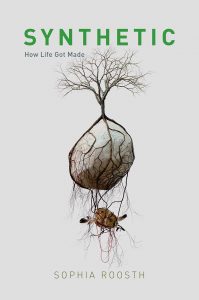Synthetic: An ethnography of life

Reposting this fabulous review and commentary by Christina Agapakis at New Scientist on Sophia Roosh’s Synthetic: How Life Got Made—after the jump.
***
What is synthetic biology? This question has vexed synthetic biologists and journalists alike since the discipline was named at MIT more than 15 years ago. Is synthetic biology a technique? A goal? A state of mind?
In her ethnography of the field, Synthetic, Sophia Roosth offers a useful answer. “Synthetic biologists, by a pragmatic definition, are people who identify as synthetic biologists… at a methodological level what unites this diverse cast of characters is sociology,” she says.
The social life of synthetic biologists is just as important to understanding the field as its technical content; it’s the beliefs, ambitions and relationships of these people that make the field what it is.
Roosth dives into the history, anthropology and peculiar society of synthetic biologists – of which I consider myself a member, having been trained in a synthetic biology lab across the river from the labs Roosth describes.
Synthetic is a traditional anthropological monograph: there are chapters on religion, kinship, property, labour, the household and origin myths. Roosth grounds each chapter in her long-term engagement with the community, and her historical and theoretical analyses give insight into synthetic biologists’ beliefs, practices and language. In one chapter, she draws on queer kinship theory to analyse how synthetic biology is redrawing the tree of life; in another, she offers a Marxist explanation for how automation is accelerating and deskilling biotechnology work at companies like Amyris and Ginkgo Bioworks (where I work).
Language is central throughout Synthetic, and a particular focus is laid on the oxymoron of the term “synthetic biology” itself. More than anything else, the word “synthetic” in this context confuses people. Interspersed between the book’s main chapters are interludes meditating on the word – how it has been used to describe textiles, styles of modern art, organic chemistry, electronic music, philosophical analysis and – in a different, 19th-century context – biology itself. These interludes suggest that synthetic biologists have a very particular idea of what knowledge is: something synthesised through construction rather than analysed through reduction.
“It is the beliefs, ambitions, and relationships of these people that make synthetic biology what it is”
Roosth’s analysis uncovers the origins and varied practices of the field, from early conversations about design, standards and the understandability of life at MIT in the early 2000s, to contemporary attempts to use “unnatural” techniques to revive extinct species and return the world to a more “natural” state, such as George Church’s goal of returning woolly mammoths to Siberia.
Synthetic vividly captures the challenges of communication: how words like “design”, “engineering”, “creation”, “nature” and “species” are used and understood within the field, and how these understandings have shaped synthetic biology practices.
In her analysis of labour, property and non-institutional biology, such as DIY bio labs, Roosth captures the changing and sometimes precarious nature of work as a biologist; something that is likely to resonate with many readers.
Synthetic also reveals how the prevailing culture influences how scientists and engineers make sense of, and remake, the world. Fantastic promises and existential fears have been wrapped around synthetic biology. Practitioners are heard promising to remake life itself to cure disease and solve environmental challenges; nay-sayers warn of pandemics and genetic contamination. Underlying each promise, threat and experimental design are assumptions about what life is and what it should be. These assumptions are influenced by the culture in which synthetic biology emerges. Synthetic is a necessary book for making sense of that culture and the likely implications of its influence.
In the aftermath of the March for Science in Washington DC last month, the role of politics and culture in science, and vice versa, is again under the microscope, and not just in the US. While scientists may strive for a science that is free of political prejudice and ideology, it is an ideal that few believe can be achieved, even if – as I rather doubt – it is something we should wish for.
For all the rigour that goes into their making, science and technology are still things that human beings do, and as Roosth reminds us, humans are messy. We have opinions, passions and biases; we argue, we learn, we fall in and out of love. As a synthetic biologist, I’ve seen first-hand what may yet prove to be foundational debates about how life works and how it should work. I’ve also learned from anthropologists and historians like Roosth that to do good work, we can’t ignore our humanity or wipe away our history. Instead, we must work to more deeply understand the very human practice of science. Reading books like this one will help.
***
To read more about Synthetic, click here.
To read more at New Scientist, click here.